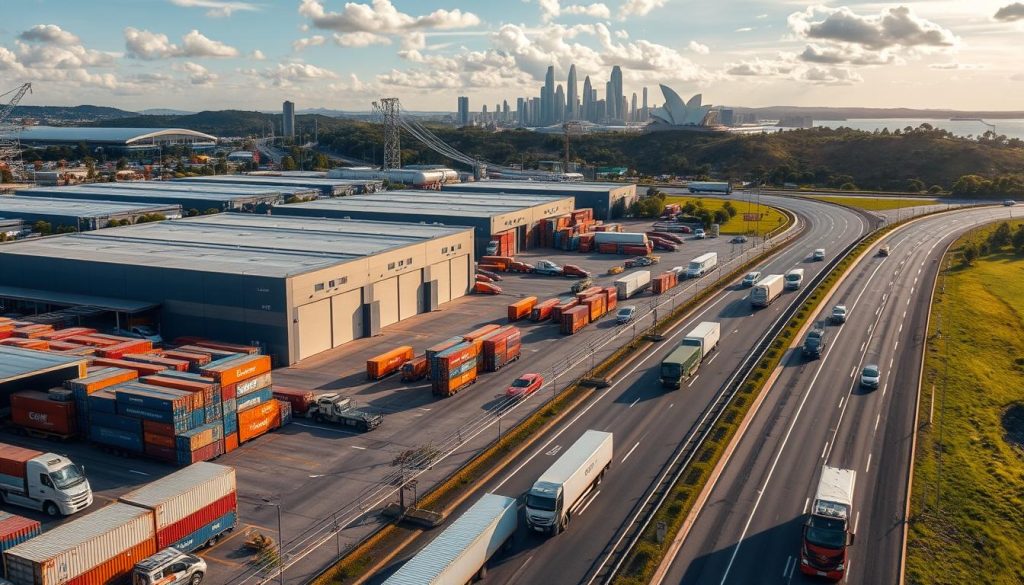Expanding into Australia’s logistics market is a great chance for UK businesses. The country’s strong economy and growing need for good supply chain services make it an attractive place. Australia’s focus on improving its infrastructure and its active trade scene offer many transport opportunities.
This article will give you important information about the chances and hurdles in Australia’s logistics world. It aims to help businesses understand this exciting new market.
Understanding the Australian Logistics Landscape
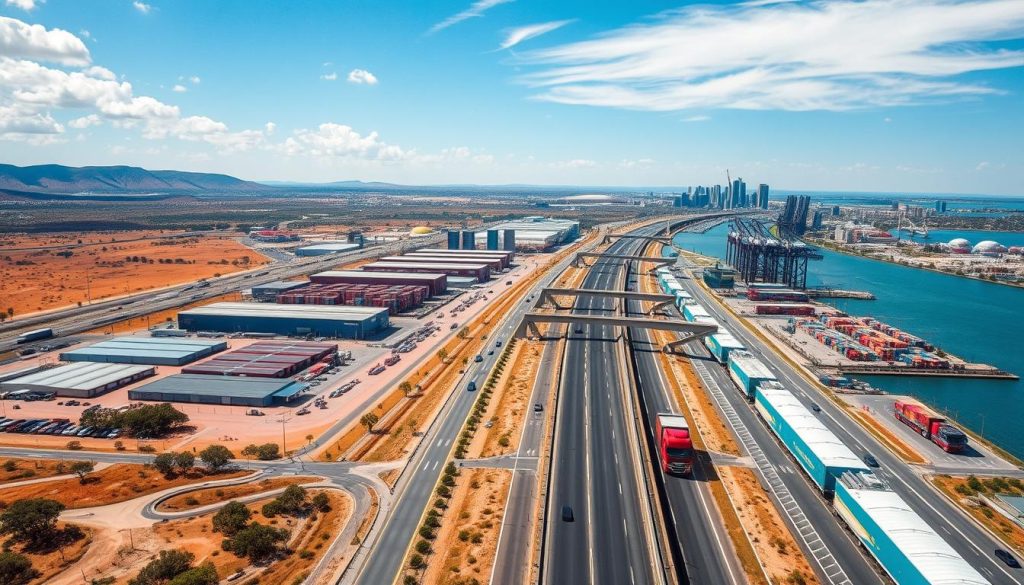
The Australian logistics scene is complex and vital to the country’s economy. Australia’s vast distances between cities affect its logistics network a lot. Good transport systems are key for on-time deliveries across the country.
Transport options in Australia include road, rail, sea, and air. Road transport is the most used for local and regional deliveries. Rail is important for long-distance freight, being cheaper and better for the environment. Sea freight is crucial for Australia’s island status, with many ports for international trade. Air freight is for fast delivery of perishables and valuable items.
Market analysis shows online shopping has changed the supply chain a lot. Online shopping is growing, making logistics operations better. Important freight routes have been set up to improve goods transport between cities and regions.
- Road Transport: Dominant mode for local deliveries
- Rail Transport: Efficient for long-haul freight
- Sea Freight: Essential for international trade connections
- Air Freight: Critical for urgent goods
Knowing about these parts of the Australian logistics scene helps businesses understand and work in this complex area.
Key Factors Driving Growth in Australia’s Logistics Sector
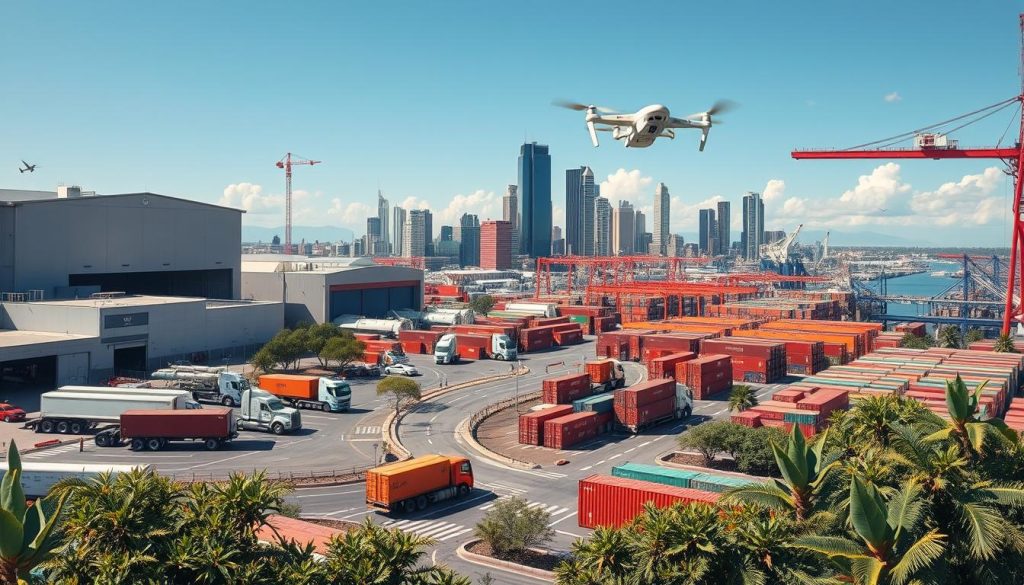
The Australian logistics sector is growing fast. A big change is the rise in online shopping. This has made companies work harder to deliver quickly and efficiently.
More people mean more demand for logistics services. This is because a bigger population needs better ways to get goods. The government’s investment in transport and logistics is key to growth.
Environmental worries are also pushing the sector to change. Companies are now looking for ways to be greener. This move towards eco-friendly practices meets government rules and customer wishes for sustainable products.
Transportation and Logistics Business Opportunities in Australia
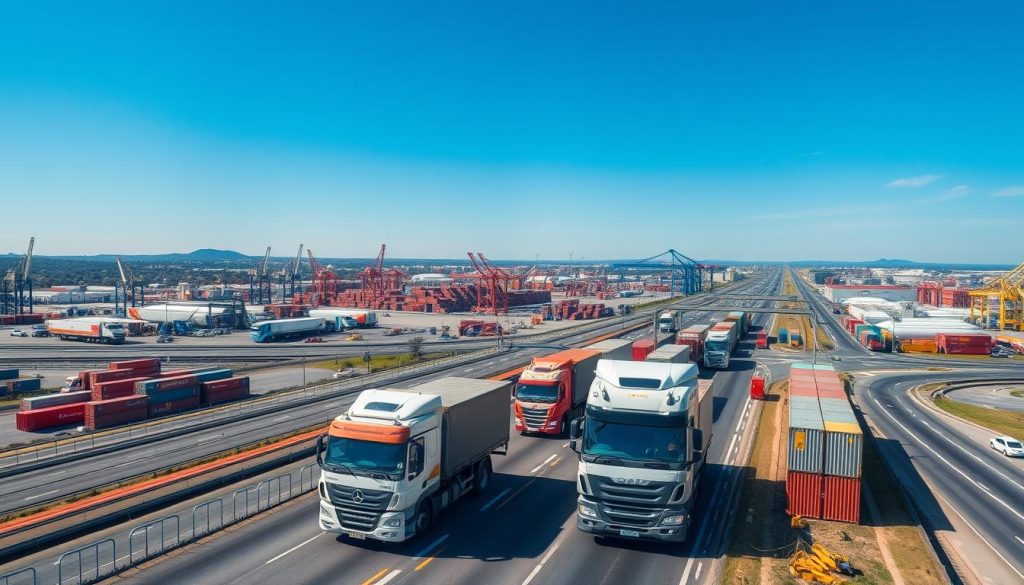
Australia’s transport sector is full of chances for businesses. This is thanks to changing what people want and new tech. Companies interested in logistics will find many trends to watch. These trends lead to new ideas and show which areas are ready for investment.
Emerging Trends in the Australian Market
The Australian logistics market is moving towards being more efficient and quick. Some key trends include:
- Last-mile delivery solutions, focusing on rapid and direct fulfilment.
- Warehouse automation technologies, improving operational efficiency.
- Cold chain logistics, essential for sectors like food and pharmaceuticals.
- The integration of data analytics for better supply chain management.
Critical Sectors to Explore for Investment
There are several key sectors in this fast-changing market. They offer great chances for investing in logistics:
- Mining: Australia’s huge mineral resources mean logistics for mining is crucial.
- Agriculture: There’s a growing need for efficient transport of fresh produce.
- Pharmaceuticals: Reliable and compliant logistics in the pharmaceutical sector are in high demand.
Challenges Facing Logistics Companies in Australia
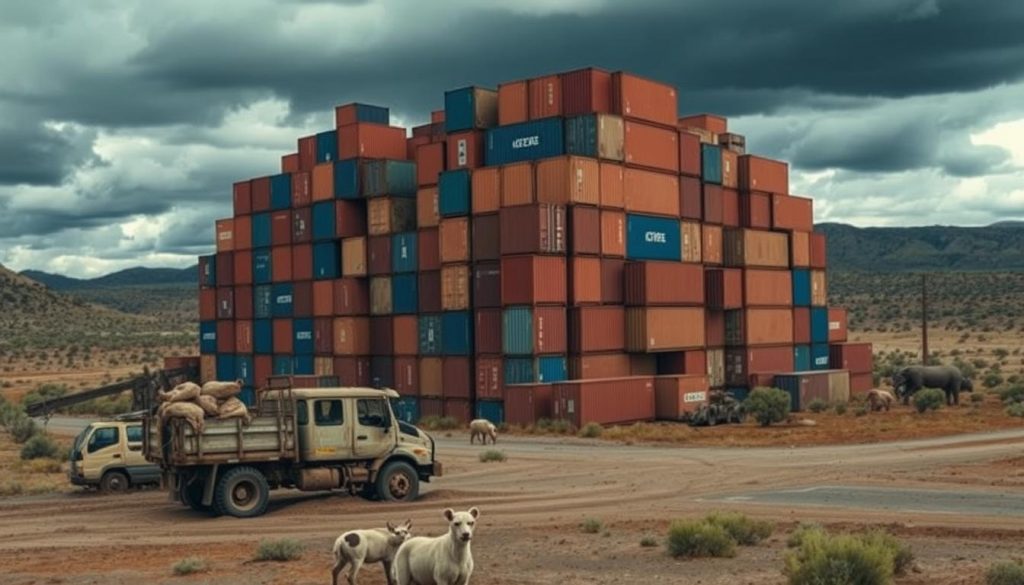
The logistics sector in Australia is facing many challenges. One big issue is a shortage of workers. As demand grows, finding skilled staff becomes harder. This makes it tough for companies to keep up with orders and maintain quality.
Another problem is rising costs. Fuel, wages, and maintenance expenses are going up. This makes it hard for companies to stay profitable while keeping prices low.
The vast size of Australia also adds to the challenges. Long distances between cities make distribution hard. Companies need to invest in better infrastructure, which is a big barrier.
It’s important for logistics companies to understand these challenges. This knowledge helps them succeed in the competitive Australian market.
Importance of Technology in Logistics Expansion

The logistics sector in Australia is changing fast. This is thanks to new technology that makes things more efficient and clear. Automation and artificial intelligence are key in making processes better. Blockchain is also changing how companies manage their supply chains.
Impact of Automation and AI on Efficiency
Automation and artificial intelligence are changing logistics. They make operations smoother. These technologies help predict demand and plan routes better. This means companies can use resources wisely.
Benefits include:
- Lower costs because less labour is needed.
- Better inventory management, leading to less waste.
- Quicker deliveries thanks to smart route planning.
Companies that use automation and AI can meet market demands better. They can deliver on time, making customers happier.
Blockchain for Enhanced Supply Chain Transparency
Blockchain technology brings new levels of transparency and security to logistics. It shares information in a way that’s safe and open. This means everyone in the supply chain can see real-time data.
Advantages include:
- It’s easier to track products, solving problems quickly.
- Trust grows because records can’t be altered.
- It makes paperwork and following rules more efficient.
As more logistics companies use blockchain, the industry gets stronger. It becomes more reliable, making it easier for everyone to work together.
Strategic Locations for Logistics Hubs
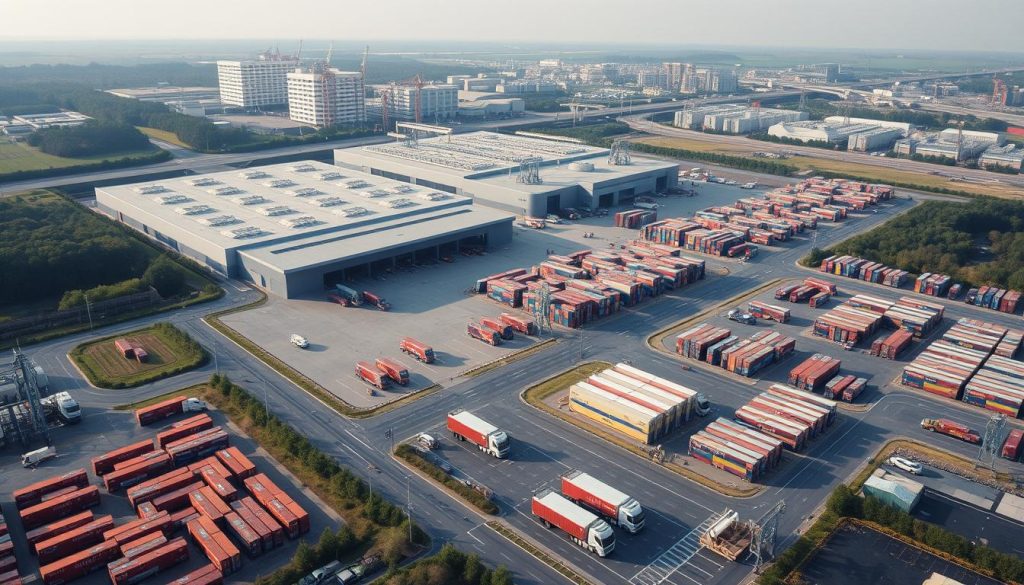
Australia’s wide geography and varied economy offer great chances for logistics hubs. Choosing the best places for these hubs is key to better operations and lower costs. Cities like Sydney, Melbourne, and Brisbane are top picks because of their good transport links and close access to markets.
These cities have important features:
- Sydney: It’s Australia’s biggest city, with a major port and good rail links. It’s easy to get to both home and abroad markets.
- Melbourne: It’s famous for its strong manufacturing and busy freight routes. Melbourne plays a big role in the country’s logistics.
- Brisbane: With a growing economy and new transport projects, Brisbane is set to be a key logistics hub. It will serve Queensland and northern areas well.
Outside big cities, new regional hubs are also being noticed. Places like Newcastle, Perth, and Adelaide are seen as promising for distribution centres. They offer a chance to avoid the problems of city traffic and high costs.
Putting money into these strategic spots can boost Australia’s logistics network. It will help the logistics industry grow. By placing distribution centres in areas with good transport, deliveries can be on time, making customers happy.
Regulatory Environment for Logistics Businesses
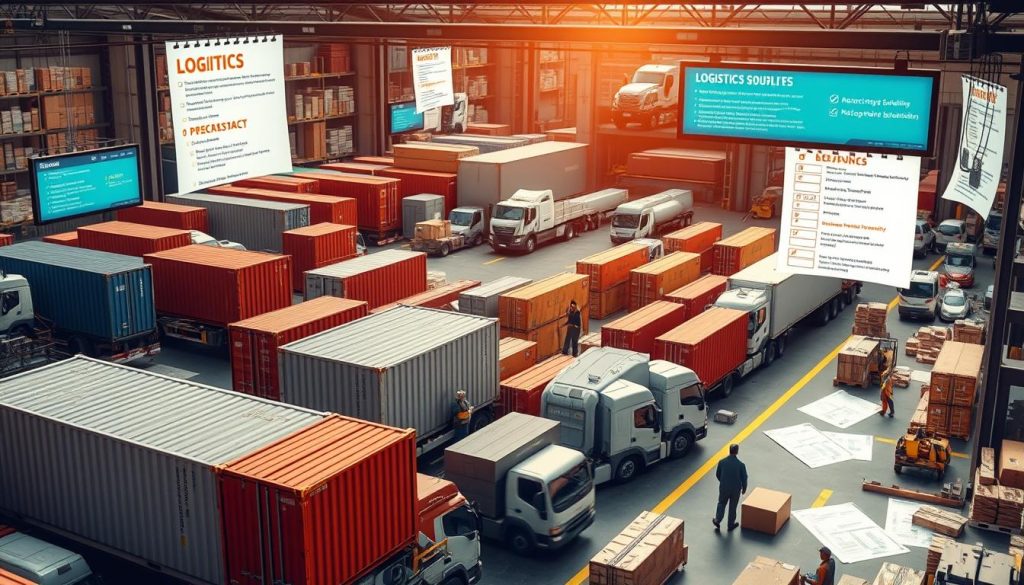
The logistics sector in Australia has a complex set of rules. These rules are key for smooth operations and following the law. It’s vital for businesses to know about customs and transport safety standards.
Navigating Customs and Import Regulations
Customs rules are very important for logistics companies. They tell how to bring goods into Australia. Businesses need to understand:
- The Australian Border Force (ABF) requirements
- Import documents and permits needed
- Taxes, duties, and tariff rules
- Following the Biosecurity Act and other import rules
Knowing these customs rules helps with smoother imports. It also avoids delays or fines for not following the law.
Understanding Transport Safety Regulations
Transport safety rules are crucial for protecting cargo and people in logistics. Following these rules is a must. They cover:
- Vehicle safety checks and standards
- Driver training and qualifications
- Guidelines for loading and handling cargo
- Emergency plans and reporting incidents
Logistics companies must keep up with transport safety rules. Keeping safety high is key for success and following the law.
Environmental Considerations in Logistics

The logistics sector is under a lot of pressure to reduce its environmental impact. As companies grow, the need for green logistics practices grows too. There are many ways to cut down on carbon emissions and make operations more efficient.
Creating sustainable logistics solutions requires a wide range of strategies. Important areas to focus on include:
- Adoption of alternative fuel sources such as electric and hybrid vehicles to minimise carbon emissions.
- Use of smart route planning technology to optimise delivery schedules, reducing fuel consumption.
- Investment in energy-efficient warehousing practices to lower environmental footprints significantly.
Regulatory incentives are key in pushing for eco-friendly operations. Governments around the world are creating policies to reward companies that go green. This change shows a move towards more responsibility in the industry. It’s crucial for businesses to stay updated on new laws.
Partnerships and Collaborations in the Australian Market
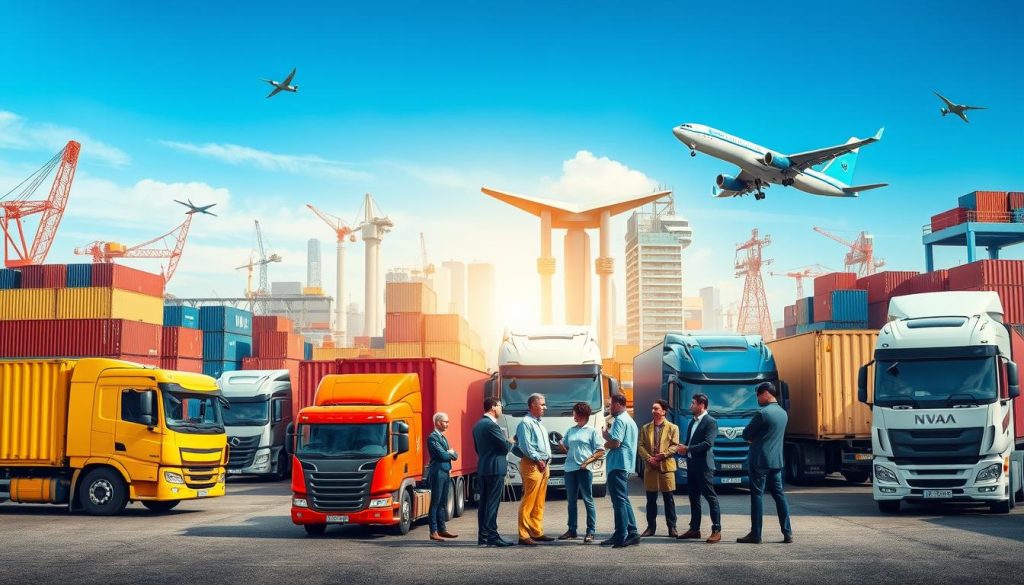
In the Australian logistics sector, forming partnerships and collaborations is key. Working with local operators who know the market well is vital for success. They offer insights that help businesses be more efficient and adaptable.
Leveraging Local Expertise for Market Entry
Getting into the Australian market needs a deep understanding of its unique aspects. By teaming up with local businesses, logistics firms can:
- Get valuable market insights and trends.
- Use established networks for smoother operations.
- Build community relations to boost brand reputation.
Such partnerships help companies avoid risks from unknown regulations and consumer habits. They also use the quick thinking of local partners.
Creating Sustainable Supply Chains Through Partnerships
It’s crucial to make supply chains sustainable. Collaborations on sustainability can bring new ways to cut environmental harm. This can happen through:
- Sharing resources to reduce waste.
- Working together on eco-friendly tech.
- Starting joint projects for green logistics.
These partnerships help businesses act responsibly and make supply chains stronger. This leads to lasting success in the industry.
Innovations Shaping the Future of Logistics in Australia

The logistics industry in Australia is changing fast. New technologies and trends are making operations more efficient and customer service better. Automation, artificial intelligence, and data analytics are key innovations.
Automation is making a big difference. Robots in warehouses cut down on manual work and boost order accuracy. Companies like Australia Post have seen big improvements in delivery times and productivity.
Artificial intelligence helps make better decisions by analysing data. It leads to smarter logistics plans. AI also helps plan delivery routes better, saving time and fuel. Plus, it predicts demand, helping companies meet customer needs.
Blockchain technology is also becoming popular for supply chain transparency. It ensures all parties can see a secure, unchangeable record of transactions. This builds trust and reduces fraud and inefficiencies.
Investing in new technologies helps Australian companies stay ahead. These advances will shape the future of logistics, making it more efficient and responsive.
Market Entry Strategies for UK Logistics Companies
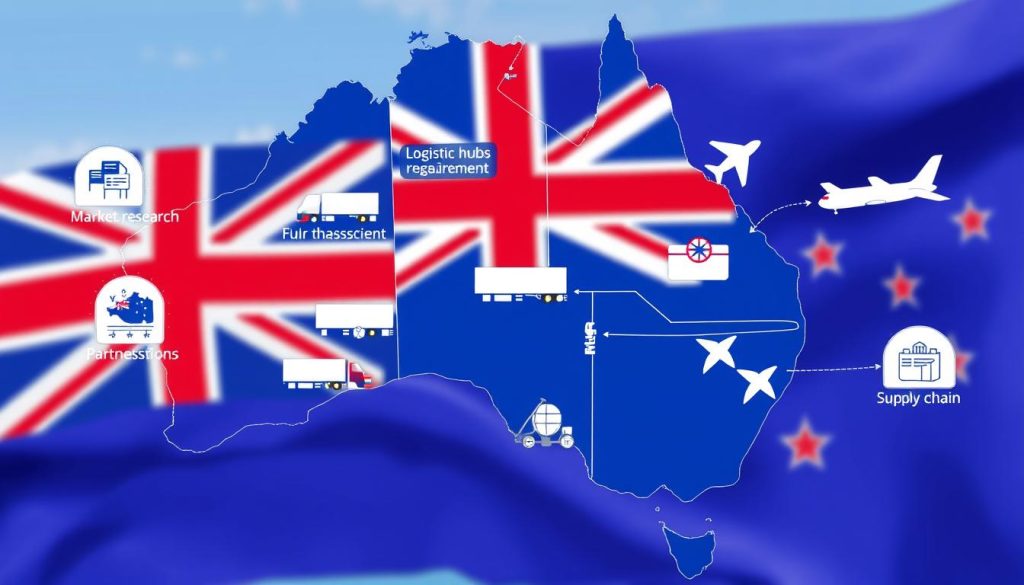
UK logistics companies looking to enter the Australian market need to have specific plans. It’s important to know what local customers want and the challenges they face. The demand for precise and flexible supply chain services is growing.
Assessing the Demand for Precision Logistics Services
Precision logistics services meet the needs of today’s complex supply chains. UK companies should look at a few key things to understand the demand:
- Market research to find out what customers expect.
- The technology available to support these services.
- How they compare to others in the market.
- Opportunities to work with local providers to improve services.
By matching their services to what Australia needs, UK logistics firms can stand out. Knowing how to tailor their strategies is crucial for success in Australia’s unique logistics scene.
Case Studies of Successful Logistics Expansions
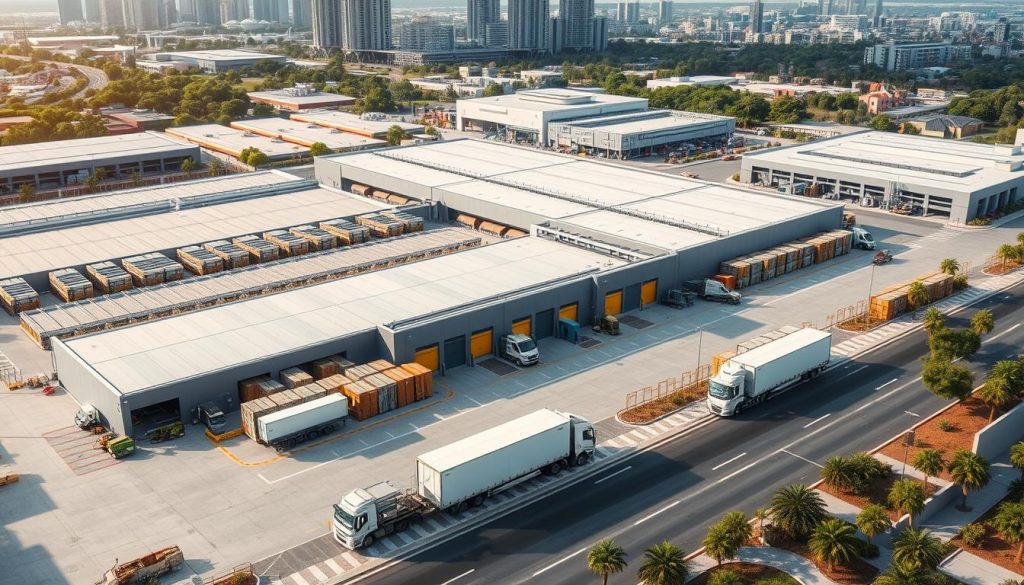
Looking at real-life examples can give UK logistics companies great insights for expanding into Australia. These stories show how to succeed and overcome challenges in a tough market.
DHL Supply Chain is a great example. They grew in Australia by focusing on what locals need. They also trained the local workforce and adopted green practices. This made them a top choice for customers, showing how important it is to understand and respect local culture.
Kuehne + Nagel also made a big impact in Australia. They formed strong partnerships with local businesses and used new technology. This helped them deal with rules and regulations smoothly, making their operations more efficient.
What made these companies successful includes:
- Adapting to local market needs
- Working with local partners
- Using technology to improve operations
- Being committed to sustainability and community
These examples show different ways to grow in the Australian logistics market. For those thinking of entering, learning from these stories can help plan a better strategy.
Networking Opportunities within Australia’s Logistics Sector
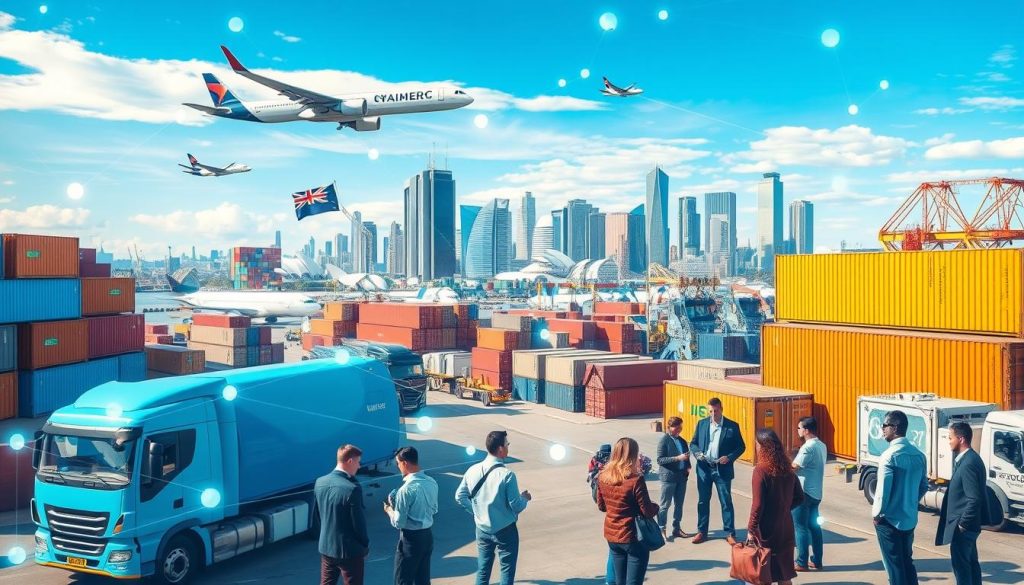
In Australia’s logistics sector, networking is key. It helps professionals build strong relationships. These connections lead to valuable partnerships, a better grasp of the market, and sharing of best practices.
Several key events are where logistics pros meet. These include:
- Australian Supply Chain & Logistics Conference
- Logistics & Supply Chain Management Summit
- National Transport Summit
By joining these events, UK logistics firms can make a mark in Australia. They also get to meet local experts. Networking is vital for understanding the Australian market and what local customers want.
Groups like the Supply Chain and Logistics Association of Australia are great for ongoing talks. They help businesses tackle the challenges of entering the Australian market.
Using these networking chances can boost teamwork between UK and Australian logistics teams. It makes the whole industry better with new ideas and more efficient operations.
Future Projections for the Logistics Industry in Australia
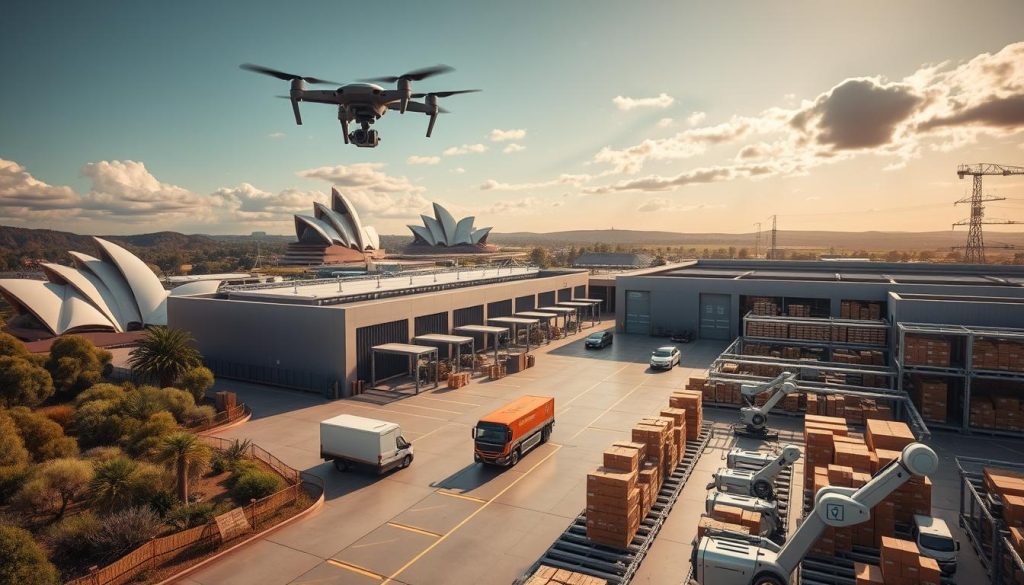
The logistics industry in Australia is at a crucial stage. It’s expected to grow significantly. This growth is due to global changes and the need for more efficient and innovative supply chains.
By 2030, the Australian logistics market could grow by about 30%. This is because of more online shopping and a need for precise logistics services. The market is moving towards more digital and integrated supply chains, thanks to new technologies.
Several areas are set to see big changes:
- More investment in automation and AI to make operations better.
- More focus on green logistics to meet environmental rules.
- New logistics hubs near big cities to improve delivery times.
These changes show the industry’s ability to meet future needs. Australia is becoming a key player in the Asia-Pacific logistics world. It’s important for everyone involved to keep up with these changes to make the most of new chances.
Conclusion and Next Steps for Interested Businesses
The logistics scene in Australia is changing, offering UK businesses great chances to grow. This article has shown how important it is to have a solid logistical plan. You need to understand the local market and rules well.
Planning and research are key to entering the Australian market successfully. They help your business grow and thrive.
Building strong partnerships with local businesses is crucial. They can share vital insights about the Australian market. This helps improve your logistics strategy and keeps you ahead of market changes.
Working with established networks also helps a lot. They can guide you through customs and transport safety rules. This makes it easier to operate in Australia.
In short, this is a call to action for businesses looking to enter the Australian logistics market. With careful planning, research, and local partnerships, UK companies can achieve lasting success in this exciting market.

